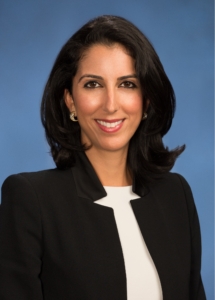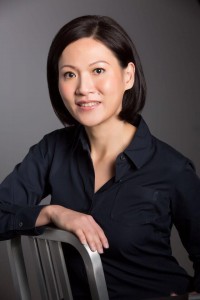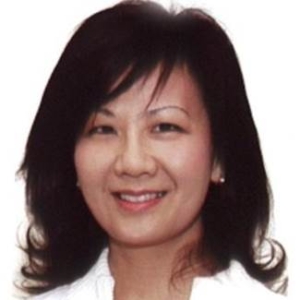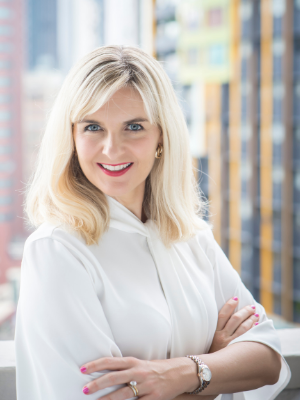 “There are not many people that are willing to take on that challenge of being in a new role and different geography,” reflects Jessica Jones. “I was very open to this change, and put myself forward early in my career. I made sure that my managers knew, that while focused on my current role, this is something that I would be interested in, if the right time came.”
“There are not many people that are willing to take on that challenge of being in a new role and different geography,” reflects Jessica Jones. “I was very open to this change, and put myself forward early in my career. I made sure that my managers knew, that while focused on my current role, this is something that I would be interested in, if the right time came.”
Working in Asia
Born in the UK and raised in South Africa, Jones became comfortable with change, adapting, and being the new person in an environment from an early age.
Jones worked for Goldman Sachs for 17 years, where she headed diversified businesses across Europe, Australia and ultimately in Asia. She took a Hong Kong-based opportunity with PGIM, a top-10 global investment manager after completing her second maternity leave last September.
“I have had a very rewarding and dynamic career with another exciting chapter ahead. Because I’ve had such supportive managers and sponsors, I’ve had fantastic opportunities to step up, and have had the privilege of covering a number of regions and countries from a very early moment,” she says.
After visiting Hong Kong during her gap year, Jones became fascinated with Asia and kept her eye on opportunities in the region. She eventually made the leap ten years ago, taking a Head of Asia-Pacific role based in Australia first, before moving to Hong Kong. As the APAC asset and wealth management industry continues to grow exponentially, driven largely by China, the number of high-net worth clients has grown, and global private banks have sought to expand their footprint–making it an exciting region to work in.
She’s had the privilege of watching her client counterparts move around too: “It’s been incredible to develop these long partnerships with clients who are also moving in their roles all the time. It has helped me to understand the global businesses that our clients are in, so it’s fantastic perspective.”
Immersing in a Culture Through Passion
Accustomed to being the ‘outsider’ who doesn’t speak the local language, and often the only woman in a room, Jones is passionate about getting to know a new region and has found her clients enjoy the different perspectives she can bring to the table.
“I am building teams who are local experts in their regions, who are Cantonese- or Mandarin-speaking in Hong Kong, and who can get much closer than I ever will to the relationship managers or investment counselors,” she says, “They bring the local perspective and the ability to converse and steer me in the right direction. That’s a fascinating aspect of my role–to adapt and enjoy the cultural differences.”
Located in one of the most restrictive quarantine regimes over the last two and a half years, and having yet to meet her PGIM team or clients in an office, Jones still has a feeling of “going through it together.” In Hong Kong, there’s been a rebirth of popularity around the traditional 19th century Chinese tile-based strategy game named Mahjong–involving 144 tiles placed on the table and four players. Having begun playing regularly during semi-lockdown and mostly with women, she’s a self-confessed enthusiast, and highlights language happens in many ways.
“You put these tiles out, shuffle them, and basically try to create order out of the chaos,” she says. “It’s been really fun, and with everything closed, that’s been our chance to network and support each other. It has become a bonding opportunity and stress reliever.”
Jones’ passion for the culture has helped her open new doors and develop great relationships. “The game is about luck and skill, but also has become a way of honing in on my local cultural skills. My clients are amazed I know how to play, although I still have so much to learn. I can’t speak the language, but I can speak the language of Mahjong,” she says.
Jones is emphatic about becoming a part of the region: “I have my residency and both my children were born here, so I’m very much rooted here. This is home for me, and I’m committed to Asia, and so my clients tell me they have adopted me as a local.”
Raise Your Hand and Stretch Your Limbs
Jones attributes her career success both to raising her hand early to say she was open to new opportunities, and a willingness to take on stretch roles as they came up.
“Don’t just assume that people know what you want. You need to make sure that your managers and your stakeholders know that you are interested in other opportunities,” she says. “Don’t be scared to let them know. It’s not like you’re going to be fired because you’re driven and want to move and grow.”
For anyone else who feels the call to get out of their comfort zone, she emphasizes you don’t need to have been there before or know the language to thrive: “If you have the right attitude, being outside of your comfort zone makes you stronger and stretches your mind, and it makes you learn at a very fast pace.”
As the years have accumulated, Jones’s steady base is her product and business acumen, with new regions and new types of wealth management presenting opportunities to stretch. Learning on the job has taught her a lot about herself and how she adapts.
Being brave and taking risks are two traits she feels have supported her journey: “It’s always tempting to stay in the safest option, because you’re scared of making a mistake or damaging your professional reputation. But being open to trying new strategies, new areas, new growth and new innovation are a great way to progress your career. Risk needs to be calculated, but take those risks early.”
She recommends building a strong network from the beginning, and is amazed how much the relationships she has built over two decades help her to stay in touch with lessons, inspiration, opportunities and innovation from different regions.
You Cannot Communicate Enough
“My advice to anyone going into a new leadership role is you can’t communicate enough. There is no such thing as over-communication,” says Jones. “Good communication helps us be connected, engaged and understanding where we are all trying to go.”
As she’s become more senior, Jones has had to get even better at communication.
“As a leader, you need to constantly be communicating your vision–the goals, the purpose of the team, the roles that everyone has and responsibilities. You need to keep communicating the progress that’s being made, within your team but also to stakeholders,” says Jones. “Especially being so far from headquarters, you really need to communicate and advocate for your team, and be the PR agent for your team, your business and the opportunities in the region.”
She’s learned the importance of tailoring your approach: “There’s different communication for different people and learning styles, so I need to keep thinking about how my messages may be coming across. Do I need to adapt the way I communicate to my team and to different stakeholders? Some people want a lot more analytical data, others want the big picture strategy, and also there’s the consideration of different cultures and perspectives–all influence how someone wants to be updated.”
People Want to Work With Others They Like
Blessed with wonderful mentors who championed her growth and her dreams, one of the best pieces of advice Jones has received along the way is that people want to do business with people they like and enjoy working with–and that translates to all regions and parts of life.
“We’re all very busy, so people want to work with people they feel they have a good connection with,” she says, “You want to develop relationships where you become their best business friend or partner, and where you also enable your clients to look good in their role by bringing the best investment advice, research and ideas. I advise my team that we cannot control the investment products or the market, but we can control the relationship we are building with our key partners in the region. Every opportunity you have, make sure to develop a great relationship with impact, and over time that builds a great partnership.”
She also advises women to leverage being the memorable person in the room or the social event or the pitch: “Rather than being intimidated, use it to your advantage because you don’t realize that you are going to be memorable. People are perhaps not going to remember all twelve guys around the table, but they’re going to remember you, so remember you bring a different perspective.”
Above all, she iterates the importance of enjoying what you do, and feeling a sense of purpose and passion.
“For me, living and working in these different cultural environments has broadened my horizons, perspective and experience, personally and professionally, and I feel I have a dream job,” she says. “I get to work and live and travel in such an exciting region of the world and call it my home and it still fascinates me every day.”
Stand Where You Are
If there’s anything Jones has discovered in being unable to leave Hong Kong in the past two and a half years, it’s to take advantage of the place you are living. Before this time, she mostly traveled off to another country for a spectacular beach or to see family or friends, and realizes now she had not been as present in the moment and enjoying where she lives.
Since embracing “staying put,” Jones and her family have been appreciating incredible hiking trails and island beaches and other parts of the surrounding area, right on her doorstep, that she never knew existed.
“No matter where you are in the world,” she says, “it helps to realize how lucky you are, and to take full advantage of the present and the place that you are in to get more inspiration.”
By Aimee Hansen

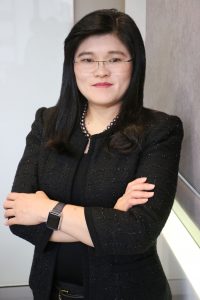 Speak up; share your aspirational goals; and pursue your ambitions, advises PwC Thailand’s Vilaiporn Taweelappontong.
Speak up; share your aspirational goals; and pursue your ambitions, advises PwC Thailand’s Vilaiporn Taweelappontong.
